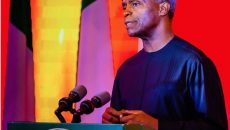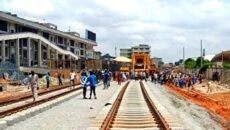Managing A Tottering Economy
Two years into President Muhammadu Buhari’s administration, the economy still wobbles with telling effects on the people
Acting President Yemi Osinbajo’s Democracy Day assessment of what Nigerians are passing through was a graphic picture of the economic reality in part; and stating otherwise as many politicians would have preferred, would have also amounted to insensitivity and a mockery of the change mantra of the ruling All Progressives Congress, APC.
“Through no fault of theirs, some companies shut down their operations, others downsized; people lost jobs, had to endure rising food prices. In some states, civil servants worked for months without the guarantee of a salary, even as rents and school fees and other expenses continued to show up like clockwork,” Osinbajo lamented, even as he admitted that the economy has proven to be the biggest challenge of all to the government.
In a rather apologetic tone, he said the government was extremely mindful of the many sacrifices that Nigerians have had to make over the last few years, for which reason the administration is targeting a combination of short-term interventions to cushion the pain, as well as medium to long term efforts aimed at rebuilding the economy.
Some of the short-term interventions Osinbajo reeled out include a series of bailout packages for state governments, to enable them bridge their salary shortfalls. But to the consternation of many, these bailout funds are said to have been diverted or misapplied as the case may be by some state governors, even as the anti-corruption war of the Buhari administration rages. The acting president said the first tasks of the cabinet and the Economic Management Team was to put together a Strategic Implementation Plan for the 2016 budget, targeting initiatives that would create speedy, yet lasting impact on the lives of Nigerians.
Conversely, in what could be viewed as a re-echoing of the same old song, he said “Indeed, much of 2016 was spent clearing the mess we inherited and putting the building blocks together for the future of our dreams; laying a solid foundation for the kind of future that you deserve as citizens of Nigeria,” as he recalled that the president in his budget presentation speech to the National Assembly last December, outlined his economic agenda in detail, and assured that 2017 would be the year in which Nigerians would begin to see tangible benefits of all the planning and preparation work. Contrary to the pleasure expressed by the acting president, that in the five months since Buhari delivered that speech, there has been tremendous progress, as promised; Nigerian can only tell tales of woes, pervasive poverty and pauperization.
Osinbajo also outlined as achievements of the administration, its Social Investment Programme, which kicked off at the end of 2016; Its home grown school feeding component, which he said is now feeding more than one million primary school children across seven states and would be feeding three million by the end of the year; N-Power, another component, which he said has engaged 200,000 unemployed graduates; micro credit to a million artisans, traders and market men and women, which he also claimed has begun. Osinbajo also told Nigerians that conditional cash transfers that would eventually reach a million of the poorest and most vulnerable households had also begun.
“Road and power projects are ongoing in every part of the country. In rail, we are making progress with our plans to attract hundreds of millions of dollars in investment to upgrade the existing 3,500km narrow-gauge network. We have also in 2017 flagged-off construction work on the Lagos-Ibadan leg of our standard-gauge network, and are close to completing the first phase of Abuja’s Mass Transit Rail System,” Osinbajo said.
With a few statistics, he said the government was taking very seriously, its ambition of agricultural self-sufficiency. He expressed delight that since 2015 the country’s imports of rice have dropped by 90 percent, while domestic production has almost tripled, stressing, “Our goal is to produce enough rice to meet local demand by 2019.” That is heartwarming, but Nigerians feel that enough speed is not being applied to the implementation of the development programmes. The feeling of despondency happens because of the high hope invested in the government of President Muhammadu Buhari.
The cardinal point of the APC presidential campaign in 2015 was short and sharp – Change. And many Nigerians succumbed with the hope that there was going to be a radical departure from the past, especially in the economy. But before long, the country began to slide into a recession largely triggered by slump in the price of crude oil in the international market and declining production level due to militancy in the Niger Delta region. That was accompanied by a stifling scarcity of foreign exchange that kept the rates of the naira hitting an all time high of about N600 to a dollar at the parallel market until lately when the Central Bank of Nigeria, CBN, began to make interventions leading to a gradual appreciation of the naira. However, the ruling party would prefer to blame the economic downturn on mismanagement on the part of the immediate past administration.
Officially, interest rates have remained high at 14 per cent, keeping borrowers at the mercy of banks. The rate is unofficially, as high as 26 per cent in some banks. According to the National Bureau of Statistics, NBS, inflation figures as at last April was 17.24 per cent.
There are conflicting reports on how soon the country can get out of recession but at a town hall meeting to highlight the achievements of the Buhari administration in the last two years, minister for Budget and National Planning, Udoma Udo Udoma, stated that the country’s economic situation was changing for the better as the macroeconomic environment was being stabilized and inflation rate trending downwards in the last two months. According to the minister, “government interventions, particularly in fixing the broken infrastructure, is making impact and there are positive signs that the economy is working its way out of recession this year unto a path of sustained inclusive growth and development.”
Similarly, finance minister, Kemi Adeosun had earlier in May, declared that the country would soon be out of the recession. However, the latest NBS report states otherwise. “In the first quarter of 2017, the nation’s GDP contracted by -052 per cent (year on year) in real terms, representing the fifth consecutive quarter of contraction since Q 1 2016. This is higher than the rate recorded in the corresponding quarter of 2016 and higher by 1. 21 percentage points from rate recorded in the preceding quarter,” the NBS said…
Follow Us on Social Media



 WhatsApp us
WhatsApp us